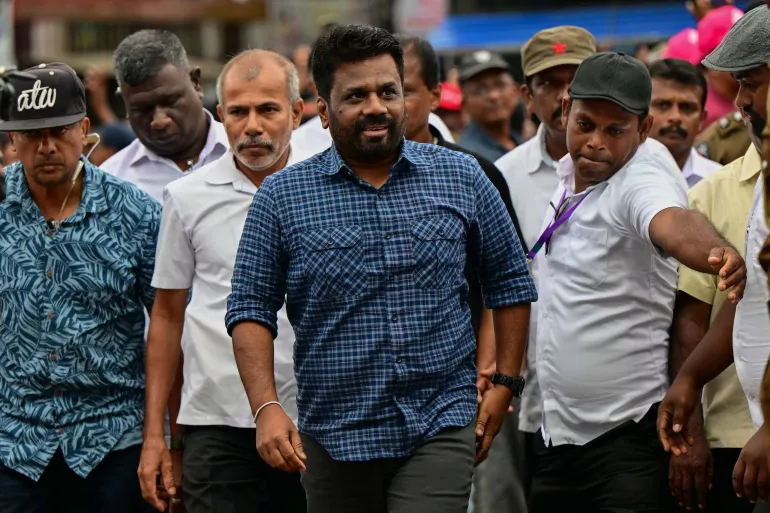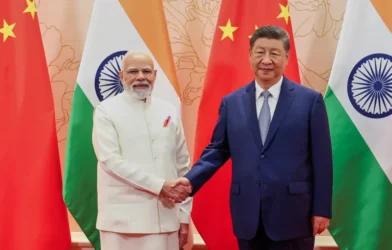Subtotal $0.00
Two years after the worst economic crisis in Sri Lanka's history toppled then-President Gotabaya Rajapaksa, the Election Commission announced on September 22, 2024 that leftist coalition leader Anura Kumara Dissanayake had won the election to become the country's president.
In July 2022, Rajapaksa fled in the wake of massive popular protests over the country's widespread corruption, the centuries-long dominance of political families, and the collapse and bankruptcy of the state.
The protests during the coronavirus pandemic reached the point of disrupting supply and transportation lines, to the point where workers and state employees were unable to travel internally to reach their jobs due to the lack of funding for oil imports.
It also coincided with a crisis in foreign reserves and severe shortages of essential items, such as medicine, food, cooking gas and fuel, as people spent days waiting in line to get them.
This led to the outbreak of widespread popular protests against the elite that ruled the country from the late 1970s until the elections in September 2024, which were dominated by the family dimension and narrow interests, and represented a very important event in the country's history, because it shifted the popular mood to a different place.
If externally the Rajapaksa family practiced a policy closer to the left, internally they leaned to the right in order to gain popular support, causing further division in the country, which is made up of different communities.
It also supported the rise of the Buddhist right and exploited a series of bombings in 2019 in churches and hotels, targeting a certain segment of the population to create a state of terror to consolidate control of power.
Media investigations, including the British documentary "The Easter Bombings in Sri Lanka," revealed that outgoing President Rajapaksa and his brother, the defense minister, were involved in facilitating and exploiting the bombings in order to provide a pretext for their return to power.
Punitive voting
Dissanayake, 55, winning the presidency of the country is a historic first for Sri Lanka, as it is the first time a person who does not belong to one of the political families that have been in power since independence in 1948.
Corruption, bankruptcy, and then popular protests prompted the Sri Lankan street to vote punitively in favor of the new president and give him a chance for change, which puts him in front of major internal and external challenges, the most important of which are the economic file, national unity, and the regional environment.
In addition, the election results showed him gaining popularity among the youth through his pro-working class, anti-elite political campaign, based on renegotiating with the IMF to make austerity measures more bearable.
Regional relations
Sri Lanka lives in a complex regional environment and relationships, most notably with India, with which it has for centuries practiced a big-brother relationship.
The relationship between the two countries is sensitive because Sri Lanka's main nationality, the Sinhala Buddhists, fear that the country will be swallowed up by Hindu India, view the relationship as a necessity and try to maintain a distance with Indian governments.
Earlier, the president-elect criticized a joint venture with India for what he described as damaging national energy sovereignty, a 20-year wind energy project involving Indian energy production group Adani, which involves investing $442 million and developing two wind power plants in the town of Mannar and the village of Bunren, located in the north of the country.
On the other hand, India fears Chinese projects in Sri Lanka and Beijing's use of its ports for military purposes, and the president's party has made no secret of its reservations about Indian policy and its "expansionist" projects.
As for the relationship with Bangladesh, it is expected to receive attention, consensus, and be active, given that the government in Dhaka is the result of a popular revolution, and in circumstances similar to the Sri Lankan government in which Muslims participate.
As for Pakistan, Sri Lanka has historically had good relations with Pakistan since independence, as it was the main link between Sri Lanka and the former East Pakistan before it separated to become Bangladesh.
It was the natural line connecting the two sides of the country at the time, which was cut off by India, and helped it in the war with the Tamil movement that sought to secede and establish a state on the northern and eastern coasts, so the relationship will see an expected improvement of mutual ties.
As for the Maldives, it is likely to be affected by the change because it is subject to the effects of the same conflict between China on the one hand and India and the United States on the other, and this change will affect it in the long run.
In the relationship with Iran, the tension between New Delhi and Tehran has reflected positively on the latter's relationship with Sri Lanka, while the use of the trade barter system between the two countries is likely to strengthen, especially in the oil file, as Colombo imports it from Tehran in exchange for tea.
The barter system allows Iran, which is suffering from economic sanctions, to avoid using hard currency to pay for tea imports, and has been using the system since 2021 to neutralize foreign sanctions.
The Iranian regime is expected to largely align itself with the Sri Lankan revolutionary regime, as both have similar orientations toward relations with regional powers and the West.
Sri Lanka in the Sino-American conflict
In terms of international relations, Sri Lanka has been at the center of the Sino-American conflict for almost 30 years, especially after the announcement of the "Belt and Road" initiative in 2013. It is among the main countries in the initiative, and is a partner in what was called the "Pearl Decade" project, and its ports are a key part of the initiative, and Beijing has invested huge sums in them.
In the past, pro-Western governments have tried to stall these projects and put obstacles in front of them, but they could not find an alternative to Chinese funding due to the difficulties facing the Western economy.
The next government is expected to resume these projects to improve the business environment and create jobs, thus developing a better relationship with Beijing, which could be an additional reason for competition between China and the United States, while India will try to play a carrot and stick policy with the next Sri Lankan government.
In Chinese foreign policy, Sri Lanka is of geopolitical importance to it, especially in the dispute with India and its attempts in cooperation with the United States to strengthen anti-Beijing alliances and encircle it strategically and regionally, noting that China is its first creditor and the largest foreign direct investor in Sri Lanka.
It is in Sri Lanka's interest to strengthen ties with China, to reschedule external debt to ensure the continued flow of funding from the IMF bailout after the country defaults on its debt in 2022.
While congratulating Anura Kumara Dissanayake on his inauguration as president, Chinese President Xi Jinping described the relationship between the two countries as "two traditional friendly neighbors who, since the establishment of diplomatic relations 67 years ago, have worked to understand and support each other, setting a good example of friendly coexistence and mutually beneficial cooperation between different countries in size."
Xi pledged to work with the Sri Lankan president for higher and more fruitful cooperation under the Belt and Road Initiative, and achieve long-term progress in the strategic partnership.
National unity
In the issue of national unity, the new president faces great challenges, because decades of rule by political families and external forces have reinforced differences between different ethnicities and religions, especially between Sinhalese, Tamils, Buddhists and Hindus, which will pose a great challenge, although the presence of the current president, who enjoys great consensus among different segments of the people, may give him a space to work.
But external powers will still have an impact on this file, especially since some of them are working to feed terrorism and create a state of instability in the country to thwart any government that does not conform to their policies.
Without security and stability, there will be no economic growth, and this could lead to the failure of the experiment of a left-wing government outside the traditional government families.
A set of measures must be taken for economic growth, the first of which is to confront the rampant corruption in the state, which has been supported by the political families that previously ruled the country and represent the deep state, and this could lead to confrontation with them.
Without combating it and reforming the country's investment system, it is difficult to find a solution to the economic crisis, an explosive file awaiting the president, and convincing foreign investment to come will be difficult in the current circumstances, and most of this investment will go to China and other Asian countries that have historical ties with Sri Lanka.
It will not be tempting for the West to invest in a leftist government while maintaining good relations with it in the manner of traditional state-to-state relations.
The issue of loans and expenditures, especially fuel, is also a major challenge, and the development of relations with Iran may contribute to solving the fuel issue to some extent, while the government is expected to resort to China to solve the issue of loans, especially since it needs additional loans to develop some important sectors.
In general, the new president faces major challenges, the most prominent and important of which is the economic situation in the country and the deterioration of services, which is the main reason for the popular protests that broke out in 2022 and led to the overthrow of the president, while the file of regional relations awaits him as he is expected to move closer to China at the expense of India for economic goals and convergence of interests.
Dissolving parliament will be a major domestic challenge for Dissanayake and his incoming government. If a new parliament is elected that is in line with his policies, it will help him overcome some obstacles, but if a divided parliament is elected, it will add a new challenge.







